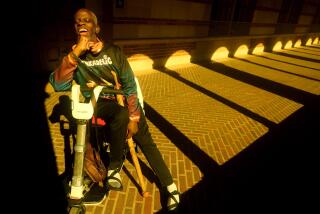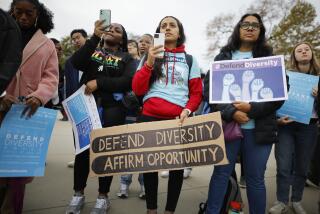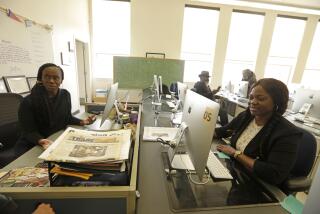She Won’t Let Disability Stand in Way of Degree
- Share via
Michele Cruz sounds much like a typical Glendale Community College student preparing to graduate Saturday. Her immediate goal after graduation is to hit a nightclub for some celebratory dancing.
But Cruz, a 27-year-old Glendale resident, is far from typical. On Saturday she will become the first hearing-impaired student to graduate from Glendale Community College. Later that evening she plans to visit a nightclub for the deaf, where she will dance by “listening” to vibrations in the floor and celebrate her achievement.
Cruz, who majored in English, is one of 459 students who will receive associate of arts degrees from the college. For the first time, the ceremony will feature an interpreter for the hearing-impaired.
During a recent interview over an amplified telephone, Cruz, who speaks clearly and articulately, talked about her achievement.
“It’s a statement,” she said. “It tells people no matter how many times you’ve been told you can’t do it, you can. It’s a matter of determination.”
Glendale College usually enrolls about six hearing-impaired students each semester, but most take classes for job training or personal interest--not to earn a degree, college officials said.
Cruz’s achievement, they hope, will set a precedent.
“I think Michele is very typical of most of the disabled students at Glendale College,” said Nancy Knight, associate
dean for disabled students. “I don’t think they have to be super-heroes anymore.”
Cruz, who has a 4-year-old son who is not hearing-impaired, said her mother developed rubella while she was being carried and that she was 60% hearing-impaired at birth. By the time she was 4, she had learned to read lips and her parents tried to improve her speech with methods such as tape-recording her voice and playing it back to her.
The encouragement worked. Frustrated with special schools for the deaf, which offered only basic math, science, history and English courses, she transferred in ninth grade to a regular junior high school, Cruz said.
The next school year, she went on to Marshall High School. The transition was not easy: Without an interpreter, she depended largely on friends for notes and help after school. And she asked teachers to try to face her when they talked.
“It’s not an impairment you can see, so they’d forget,” Cruz said.
In her senior year, she left Marshall, began a clerk’s job at a bank and earned her diploma by taking evening classes at an adult school. In 1982, after a year at Pierce College, Cruz transferred to Glendale College.
The Disabled Student Services office at Glendale College provided her with an interpreter and a note-taking assistant who accompanied her to most of her classes. Many of her teachers were understanding, she said. One, a favorite English professor, stood in front of her during class so she could read his lips.
Best of all, Glendale College offered more advanced classes in literature--which added a richness to the English language that Cruz had never known.
Literature, she found, has a much more sophisticated structure than sign language. For instance, in sign language, she explained, the phrase “I am going to school” becomes “School I go.”
“I believe that literature and mastering the language that way is going to be the key to opening up educational opportunities for the deaf,” she said.
Although she was excited about college, it wasn’t always easy for her. Teachers with heavy accents or beards were virtually impossible to understand. At times, she was unable to obtain an interpreter or note-taking assistant for a class, forcing her to borrow notes from three or four students.
“That same fear I was feeling in high school is still there,” she said. “You’re marching along with other students and you know you’re not inferior, but you don’t know that for sure until you survive the classes.”
Her hearing impairment was not her only challenge during school. Cruz temporarily left Glendale College in 1985 to marry her high school sweetheart and have a baby.
In 1987, her husband discovered he had cancer, and Cruz spent the next two years caring for him and their son. She also resumed part-time classes at the college. Her husband died last year. Her son, Anthony, attends a Burbank preschool for deaf children and youngsters with deaf relatives. He can hear perfectly, his mother explained--and now he also can read lips and sign.
“When he’s ready for kindergarten, he’ll attend regular classes,” she said. “But I wanted him to learn about the deaf world, because it’s a big part of my life.”
More to Read
Sign up for Essential California
The most important California stories and recommendations in your inbox every morning.
You may occasionally receive promotional content from the Los Angeles Times.










